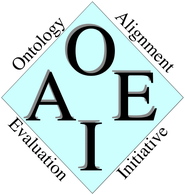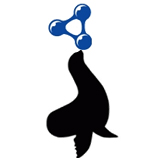

Complex alignments are more expressive than simple alignments as their correspondences can contain logical constructors or transformation functions of literal values.
For example, given two ontologies o1 and o2:With this track, we evaluate systems which can generate such correspondences.
The complex track contains 2 datasets from the conference domain: Conference and Populated Conference. Each of the datasets and corresponding evaluation methods are presented below.
The participants of the track should output their (complex) correspondences in the EDOAL format. This format is supported by the Alignment API. The evaluation will be supported by the MELT framwork this year. The participants have to wrap their tool as described at MELT framework. For executing the tasks in each dataset the parameters are listed in boxes below (repository, suite-id, version-id).
The number of ontologies, simple (1:1) and complex (1:n), (m:n) correspondences for each dataset of this track are summarized in the following table.
| Dataset | #Ontologies | #(1:1) | #(1:n) | #(m:n) |
|---|---|---|---|---|
| Conference | 3 | 78 | 79 | 0 |
| Populated Conference | 5 | 111 | 86 | 98 |
This dataset is based on the OntoFarm dataset [1] used in the Conference track of the OAEI campaigns. It is composed of 16 ontologies on the conference organisation domain and simple reference alignments between 7 of them. Here, we consider 3 out of the 7 ontologies from the reference alignments (cmt, conference and ekaw), resulting in 3 alignment pairs.
The correspondences were manually curated by 3 experts following the query rewriting methodology in [2]. For each pair o1-o2 of ontologies, the following steps were applied:
4 experts assessed the curated correspondences to reach a consensus.
The complex correspondences output by the systems will be manually compared to the ones of the consensus alignment.
For this first evaluation, only equivalence correspondences will be evaluated and the confidence of the correspondenes will not be taken into account.
The systems can take the ra1 simple alignments as input. The ra1 alignments can be downloaded here.
In order to allow matchers which rely on instances to participate over the Conference complex track, we propose a populated version of the Conference dataset. 5 ontologies have been populated with more or less common instances resulting in 6 datasets: (6 versions on the repository: v0, v20, v40, v60, v80 and v100).
The alignments will be evaluated based on Competency Questions for Alignment: basic queries that the alignment should be able to cover [6].
The queries are automatically rewritten using 2 systems:
The best rewritten query scores are kept.
A precision score will be given by comparing the instances described by the source and target members of the correspondences.
Details on the population and evaluation modalities are given at: https://framagit.org/IRIT_UT2J/conference-dataset-population.[1] Ondřej Zamazal, Vojtěch Svátek. The Ten-Year OntoFarm and its Fertilization within the Onto-Sphere. Web Semantics: Science, Services and Agents on the World Wide Web, 43, 46-53. 2017.
[2] Élodie Thiéblin, Ollivier Haemmerlé, Nathalie Hernandez, Cassia Trojahn. Task-Oriented Complex Ontology Alignment: Two Alignment Evaluation Sets. In : European Semantic Web Conference. Springer, Cham, 655-670, 2018.
[3] Élodie Thiéblin, Fabien Amarger, Nathalie Hernandez, Catherine Roussey, Cassia Trojahn. Cross-querying LOD datasets using complex alignments: an application to agronomic taxa. In: Research Conference on Metadata and Semantics Research. Springer, Cham, 25-37, 2017.
[4] Lu Zhou, Michelle Cheatham, Adila Krisnadhi, Pascal Hitzler. A Complex Alignment Benchamark: GeoLink Dataset. In: International Semantic Web Conference. Springer, Proceedings, Part II, pp. 273-288, 2018.
[5] Marc Ehrig, and Jérôme Euzenat. "Relaxed precision and recall for ontology matching." K-CAP 2005 Workshop on Integrating Ontologies, Banff, Canada, 2005.
[6] Élodie Thiéblin. Do competency questions for alignment help fostering complex correspondences?. In EKAW Doctoral Consortium, 2018.
[7] Élodie Thiéblin, Fabien Amarger, Ollivier Haemmerlé, Nathalie Hernandez, Cassia Trojahn. Rewriting SELECT SPARQL queries from 1:n complex correspondences. In: Ontology Matching, pp. 49-60, 2016.